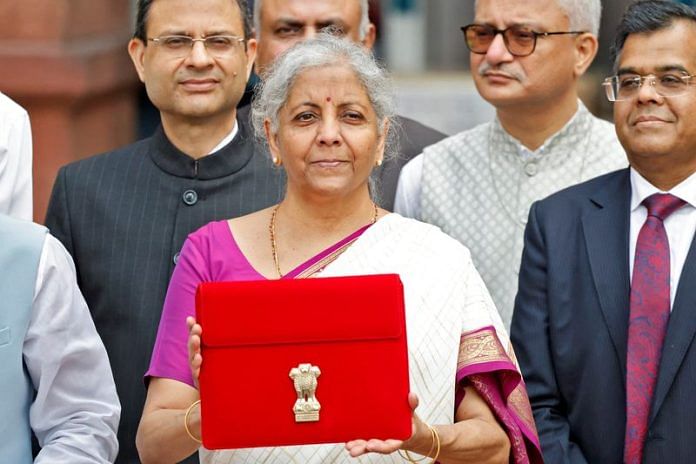By Sarita Chaganti Singh and Nikunj Ohri
NEW DELHI (Reuters) -India struck a balance between greater spending on jobs and rural development while narrowing the fiscal deficit in its 2024-25 budget unveiled on Tuesday, after last month’s election setback for the government.
Analysts blamed distress in rural areas and a weak job market for a poor poll showing that cost Prime Minister Narendra Modi’s Bharatiya Janata Party (BJP) its absolute majority, making it dependent on allies to form a government.
The government will spend $24 billion on job-spurring efforts over the next five years and $32 billion on rural development this year alone, Finance Minister Nirmala Sitharaman said while presenting the budget to parliament.
“The budget successfully engineered a fine balance between supporting job creation and skilling, rural development and agriculture, along with continued focus on infrastructure spending without compromising on fiscal consolidation,” said Sakshi Gupta, principal economist at HDFC Bank.
Amid concerns of an overheating market, Sitharaman also raised taxes on equity investments and equity derivative trading, while giving lower-income consumers some tax relief.
The government plans to cut its fiscal deficit to 4.9% of gross domestic product in 2024-25, below the 5.1% figure in February’s interim budget. It has reduced its gross market borrowing marginally to 14.01 trillion rupees.
That comes as a large surplus of $25 billion from the central bank this year has helped the government reduce the fiscal deficit while letting it spend more.
The budget’s employment-boosting measures include incentives for companies, such as those in manufacturing, and programmes to improve skills and hand out cheaper loans for higher education, Sitharaman added.
Although India’s official unemployment rate in urban areas is 6.7%, private agency the Centre For Monitoring Indian Economy pegs it higher, at 8.4%.
The government will also maintain spending on long-term infrastructure projects at 11.11 trillion rupees, offering long-term loans of 1.5 trillion rupees to states to fund such expenditure.
Some of these loans will be linked to reform milestones in areas such as land and labour, which Sitharaman said the government intended to push in its third term.
In a concession to the government’s allies, Sitharaman said it would hasten loans from multilateral agencies for the eastern state of Bihar and the southern state of Andhra Pradesh.
TAX ON EQUITIES
India raised to 20% from 15% the tax rate for equity investments held for less than a year, while for those held for more than 12 months the rate rose to 12.5% from 10%.
The government also increased the tax on equity derivative transactions that have drawn retail investors.
The tax changes are a short-term negative for the market, said Trideep Bhattacharya, the chief investment officer of Edelweiss Mutual Fund.
“The tax increase is marginal but will help bring in rationality on options trading exuberance and will better investment behavior,” said Bhattacharya, adding it would drive a push to longer-term investing.
Indian shares and the rupee declined after the news, although consumer stocks rose 2% to a record high.
The NSE Nifty 50 and S&P BSE Sensex benchmarks were down about 0.7% each by 1:15 p.m., after earlier session losses of as much as 1.6%.
The rupee slipped to an all-time low of 83.7150 to the U.S. dollar on concerns of foreign outflows.
Bond yields were flat on an expected reduction in the fiscal deficit.
($1=83.6410 rupees)
(Additional reporting by Aftab Ahmed; Writing by Ira Dugal; Editing by Clarence Fernandez)
Disclaimer: This report is auto generated from the Reuters news service. ThePrint holds no responsibilty for its content.



